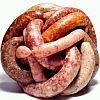Can anyone let me know if these two items are the same thing??
Thanks
All Purpose Curing Salt ( from Franco)
This salt is an easy to use replacement for saltpetre or cure 2 in recipes, this replaces the salt and the cure. If a recipe calls for saltpetre and salt simply replace the amount of salt required with this curing salt. This ready mixed formula is a mix of salt sodium nitrate and sodium nitrite, it gives guaranteed results and is safer to use than pure nitrate/nitrite.
Morton� Tender Quick�
This mix is a fast cure product that has been developed as a cure for meat, poultry, game, salmon, shad, and sablefish. It is a combination of high grade salt and other quality curing ingredients that can be used for both dry and sweet pickle curing. Morton� Tender Quick� mix contains salt, the main preserving agent; sugar, both sodium nitrate and sodium nitrite, curing agents that also contribute to development of color and flavor; and propylene glycol to keep the mixture uniform. Morton� Tender Quick� mix can be used interchangeably with Morton� Sugar Cure� (Plain) mix. It is NOT a meat tenderizer.
CAUTION: This curing salt is designed to be used at the rate specified in the formulation or recipe. It should not be used at higher levels as results will be inconsistent, cured meats will be too salty, and the finished products may be unsatisfactory. Curing salts should be used only in meat, poultry, game, salmon, shad and sablefish. Curing salts cannot be substituted for regular salt in other food recipes. Always keep meat refrigerated (36� to 40�F) while curing.
All purpose curing salt versus Mortons tender quick
10 posts
• Page 1 of 1
John
Morton TQ Ingredients:
Salt, sugar, 0.5% Sodium Nitrate (preservative), 0.5% Sodium Nitrite (preservative), Propylene Glycol.
According to http://www.sausagesource.com/catalog/mrtn-tndrqk.html
Sorry I don't know the spec for Franco's 'All Purpose Curing Salt'. Someone, on another thread, said it's for dry cure use at 15g per kg, if so, it should be less than 1% nitrite and (less than) 1% nitrate, to comply to the new EU regs. Older stock could be (less than) 1% nitrite, 2% nitrate.
Hope this helps
Phil
Morton TQ Ingredients:
Salt, sugar, 0.5% Sodium Nitrate (preservative), 0.5% Sodium Nitrite (preservative), Propylene Glycol.
According to http://www.sausagesource.com/catalog/mrtn-tndrqk.html
Sorry I don't know the spec for Franco's 'All Purpose Curing Salt'. Someone, on another thread, said it's for dry cure use at 15g per kg, if so, it should be less than 1% nitrite and (less than) 1% nitrate, to comply to the new EU regs. Older stock could be (less than) 1% nitrite, 2% nitrate.
Hope this helps
Phil
-

wheels - Global Moderator
- Posts: 12894
- Joined: Sat Sep 02, 2006 4:29 pm
- Location: Leicestershire, UK
I am guessing it's similar, but only Franco knows the mix. It's another of these issues that would be best addressed if we had access to the usage instructions etc that occassionally get left out when stuff is sent out. I'm still waiting for Franco to get back to me over this, so please be patient.
Dave
Dave
Curing is not an exact science... So it's not a sin to bin.
Great hams, from little acorns grow...
Great hams, from little acorns grow...
-

saucisson - Site Admin
- Posts: 6851
- Joined: Sat Mar 04, 2006 8:46 pm
- Location: Oxford UK
saucisson wrote:I am guessing it's similar, but only Franco knows the mix. It's another of these issues that would be best addressed if we had access to the usage instructions etc that occassionally get left out when stuff is sent out. I'm still waiting for Franco to get back to me over this, so please be patient.
Dave
Agreed, Dave
I have got stuff from Franco without instructions before and it is very annoying.
-

johnfb - Global Moderator
- Posts: 2427
- Joined: Mon Aug 13, 2007 10:03 am
- Location: Dublin, Ireland
You have MTQ nailed down reasonably well. I would mention that it is around 80% salt and 20% sugar. Those percentages should be adjusted to allow for the 1% taken up by the nitrate and nitrite (combined) and the propylene glycol that is added to make it flow freely.
MTQ is about as universal as a curing preparation gets because of the inclusion of nitrate and nitrite. However, one cannot substitute it directly in old recipes because many old recipes were very careless about how much of what they used. they were not scientific at all.
I use MTQ all the time, but at rates equal to, or less than, Morton's recommends (for various reasons, not all of which are science-based)
MTQ is about as universal as a curing preparation gets because of the inclusion of nitrate and nitrite. However, one cannot substitute it directly in old recipes because many old recipes were very careless about how much of what they used. they were not scientific at all.
I use MTQ all the time, but at rates equal to, or less than, Morton's recommends (for various reasons, not all of which are science-based)
B.F.
- Bad Flynch
- Registered Member
- Posts: 202
- Joined: Sat Apr 23, 2005 10:33 pm
- Location: Indian Territory
so if I went with;
79 % sea salt
20 % dextrose
.5 % cure 1
.5 % cure 2
I should be able to replace the commercial stuff
I was under the impression that the cure 1 was 6.25 % nitrite concentration and thus 93.75 % salt
Does this mean that if I am using "Pink Salt" (cure 1) I would have to increase that mix to 10% overall
10% cure 1 (to get 0.00625 nitrite)
10% cure #2
60% sea salt
20% Dextrose
79 % sea salt
20 % dextrose
.5 % cure 1
.5 % cure 2
I should be able to replace the commercial stuff
I was under the impression that the cure 1 was 6.25 % nitrite concentration and thus 93.75 % salt
Does this mean that if I am using "Pink Salt" (cure 1) I would have to increase that mix to 10% overall
10% cure 1 (to get 0.00625 nitrite)
10% cure #2
60% sea salt
20% Dextrose
Cheers from The Big Dog
www.lesnoiracochon.com
http://blog.lesnoiracochon.com
Where tasty things happen
www.lesnoiracochon.com
http://blog.lesnoiracochon.com
Where tasty things happen
-

Iamarealbigdog - Registered Member
- Posts: 420
- Joined: Mon Oct 15, 2007 3:18 pm
- Location: London Ontario
Big Dog
MTQ has equal Nitrate and Nitrite.
Prague/Cure #1 is just Nitrite.
Prague/Cure #2 has more Nitrite than Nitrate.
So you can juggle this all day long, but you won't get equal parts Nitrate/Nitrite like MTQ.
You could create something very similar with saltpetre and Cure (Prague) #1. The Nitrate would be sodium instead of potassium though.
HTH
Phil
MTQ has equal Nitrate and Nitrite.
Prague/Cure #1 is just Nitrite.
Prague/Cure #2 has more Nitrite than Nitrate.
So you can juggle this all day long, but you won't get equal parts Nitrate/Nitrite like MTQ.
You could create something very similar with saltpetre and Cure (Prague) #1. The Nitrate would be sodium instead of potassium though.
HTH
Phil
-

wheels - Global Moderator
- Posts: 12894
- Joined: Sat Sep 02, 2006 4:29 pm
- Location: Leicestershire, UK
I am very familiar with Morton Tender Quick because I can buy it at the grocery store. All the others I have to order by internet. Have used it for years, and even obtained the Morton's pamphlet (it is very old, I was just looking for that but couldn't put my hands on it). Morton recommends 7.5 teaspoons (2.5 tablespoons) per 5 lbs of meat. This is directly in proportion of active cure to Kutas and other recommendations for Cure #1 at 1 tsp per five lbs of meat but as noted, it is an equal combination of nitrite and nitrate. I don't know the science real well, but from a practical standpoint, it works great in cooked sausage. I was going to look at the pamphlet to see if they addressed using it for salami but I can't find the dang pamphlet. I suspect it would be OK as an all around cure for just about every kind of sausage, no?
-

Pat Anderson - Registered Member
- Posts: 35
- Joined: Fri Dec 26, 2008 3:34 pm
- Location: Fall City, WA / Birch Bay, WA
I have made a bit of cooked and smoked sausage, but I have never done any dry curing. Got the Charcuterie book, trying to figure stuff our. My basement is 63 degrees pretty much year round. RH appears to be about 48%.
Maybe I read too much and worry too much. I am an old hand with Tenderquick on sausage. I was going with Cure #2 for dry cures just because of the Charcuterie book, and everyone says you need at least 60% RH to avoid the outside drying out too quickly and not letting the inside dry. But heck, what if I just cure in Tenderquick and hang the sucker!
In fact, perhaps if folks don't mind, you could run over a blow by blow of what exactly you would do with a pork shoulder, Tenderquick and my basement! Here is what I surmise:
Mix the Tenderquick and spices. I assume the quantity of Tenderquick would be more or less the quantity of Cure #2 and salt mentioned in the book for any similar procedure. For total quantity of nitrite/nitrate, 1 tsp of = 7.5 tsp of Tenderquick.
Rub the Tenderquick - spice mixture all over the meat and put it in a big Ziplock bag, and refrigerate it for two weeks, turning every other day or so.
Rinse 'erf off, pat 'er down with paper towels, truss 'er up, and hang in the basement to dry for three weeks or more.
I would expect it to grow powdery white mold, if it grows fuzzy mold or green mold, I would wipe it down with vinegar.
Anything more complicated than that?
Maybe I read too much and worry too much. I am an old hand with Tenderquick on sausage. I was going with Cure #2 for dry cures just because of the Charcuterie book, and everyone says you need at least 60% RH to avoid the outside drying out too quickly and not letting the inside dry. But heck, what if I just cure in Tenderquick and hang the sucker!
In fact, perhaps if folks don't mind, you could run over a blow by blow of what exactly you would do with a pork shoulder, Tenderquick and my basement! Here is what I surmise:
Mix the Tenderquick and spices. I assume the quantity of Tenderquick would be more or less the quantity of Cure #2 and salt mentioned in the book for any similar procedure. For total quantity of nitrite/nitrate, 1 tsp of = 7.5 tsp of Tenderquick.
Rub the Tenderquick - spice mixture all over the meat and put it in a big Ziplock bag, and refrigerate it for two weeks, turning every other day or so.
Rinse 'erf off, pat 'er down with paper towels, truss 'er up, and hang in the basement to dry for three weeks or more.
I would expect it to grow powdery white mold, if it grows fuzzy mold or green mold, I would wipe it down with vinegar.
Anything more complicated than that?
-

Pat Anderson - Registered Member
- Posts: 35
- Joined: Fri Dec 26, 2008 3:34 pm
- Location: Fall City, WA / Birch Bay, WA
10 posts
• Page 1 of 1
Who is online
Users browsing this forum: No registered users and 3 guests

